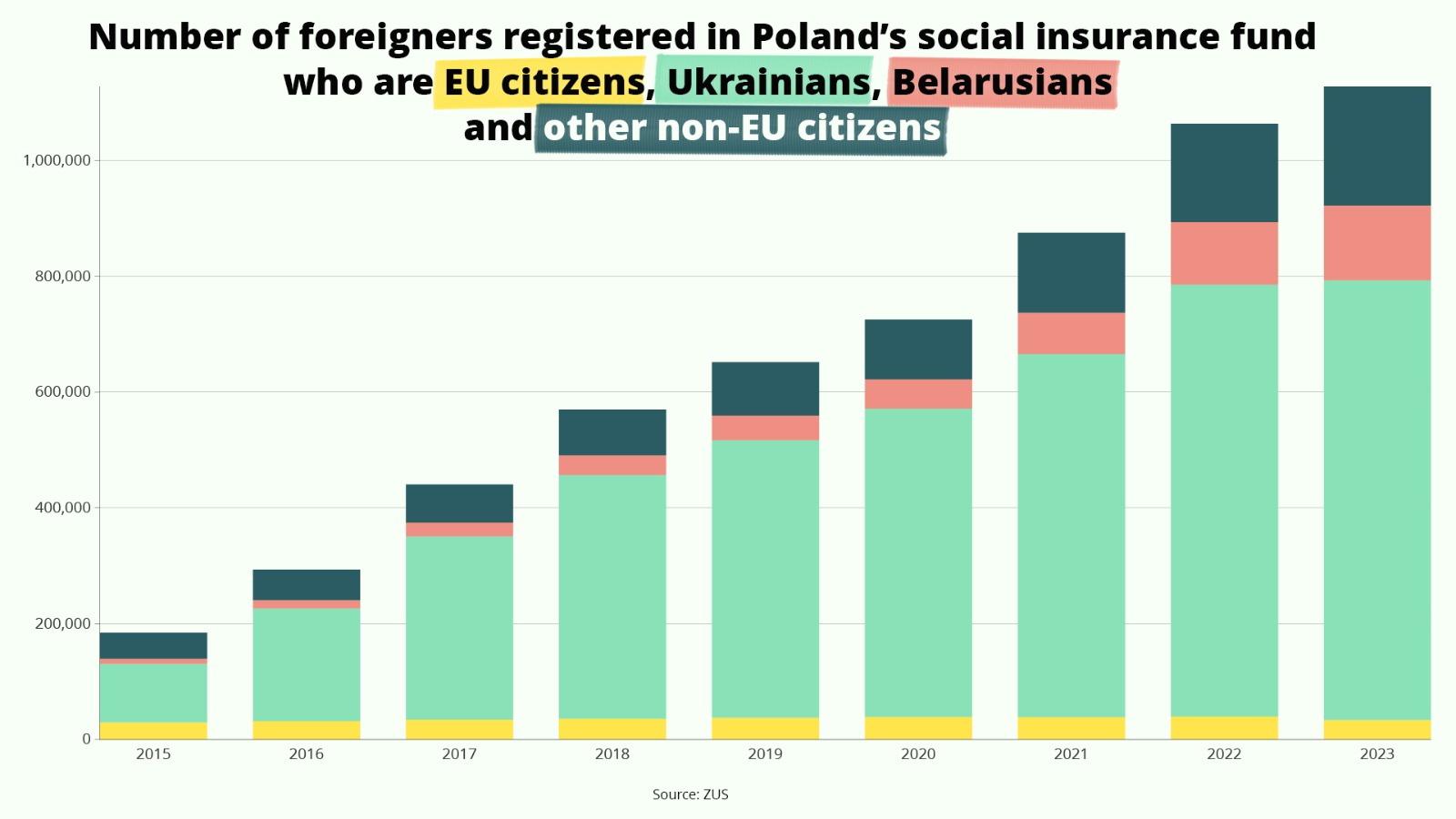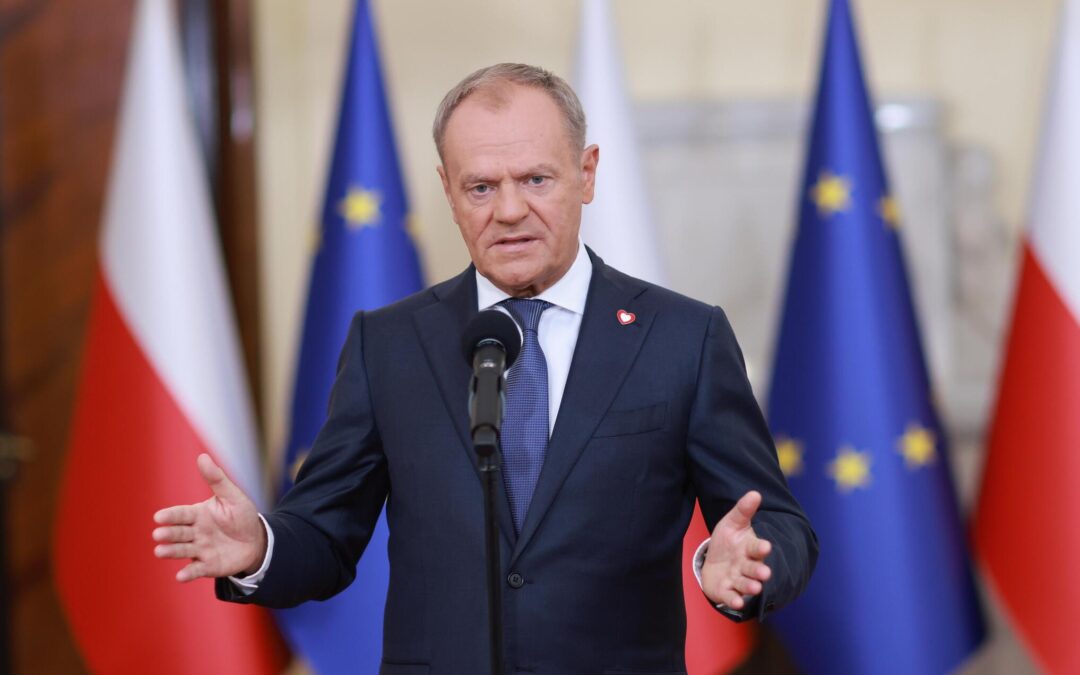Keep our news free from ads and paywalls by making a donation to support our work!

Notes from Poland is run by a small editorial team and is published by an independent, non-profit foundation that is funded through donations from our readers. We cannot do what we do without your support.
Poland will “temporarily suspend the right to asylum” and “demand recognition” of this decision from the EU, Prime Minister Donald Tusk has announced in a speech outlining a tougher new migration strategy.
Tusk was speaking today at a convention of his centrist Civic Platform (PO), the main party in Poland’s ruling coalition. He declared that a new immigration policy to “regain control and ensure security” would be presented to his cabinet on Tuesday next week.
The plan aims in particular to address the crisis on the Belarus border – where tens of thousands of migrants from Asia, Africa and the Middle East have been trying to cross – as well as failings and corruption in Poland’s visa system under the former Law and Justice (PiS) government.
“One of the elements of the migration strategy will be the temporary, territorial suspension of the right to asylum,” said Tusk. “I will demand recognition of this decision in Europe because we know very well how Lukashenko, Putin, people smugglers use this right to asylum contrary to the essence of [that] right.”
Premier @DonaldTusk w #Warszawa:
Jednym z elementów strategii migracyjnej będzie czasowe terytorialne zawieszenie prawa do azylu. Będziemy domagać się uznania tej decyzji w Europie.
— Kancelaria Premiera (@PremierRP) October 12, 2024
Migrants have been encouraged and helped to illegally cross the border into Poland by the Belarusian regime of Alexander Lukashenko. Many of those caught crossing have also been found to have Russian visas.
Most of those who do manage to cross do not remain in Poland, but head further west, to Germany in particular. In response, the German authorities have introduced controls on the border with Poland. This year has seen a growing number of people seeking to claim asylum in Poland itself.
Under international law, countries are obliged to offer people the right to apply for asylum. Poland has been accused of violating this obligation at the Belarus border by the Council of Europe’s commissioner for human rights and the UN’s special rapporteur on the human rights of migrants.
In his speech, Tusk acknowledged that his government has faced accusations that its tough border policies are inhumane. But “there is no more humane policy – in terms of preventing misfortune or death on the border with Belarus – than effective protection of this border”, said the prime minister.
If “there is an increasing awareness that [the border] is impassable, no one will die [trying to cross] this border”, added Tusk. But he also made clear that tougher border and migration policies are vital for Poland’s security.
“Poland must regain 100% control over who comes to Poland,” he declared. “After adopting this strategy, we will reduce illegal migration to a minimum…This will be objectively the safest place in Europe.”
Tusk accused the former PiS government of allowing “a wave of illegal migration [to] de facto flood Poland”, in particular through abuses in the visa system that resulted in proper checks on some recipients not being carried out.
“What they did with migration policy is absolutely outrageous. It was the most pro-illegal-migration government in Europe,” said the prime minister, who previously served as president of the European Council from 2014 to 2019.
A report by Poland’s state auditor has found large-scale irregularities in the issuing of visas under the former PiS government.
Over 366,000 were granted to people from Asia and Africa while others were given to Russians after the invasion of Ukraine https://t.co/13bcJkfA2C
— Notes from Poland 🇵🇱 (@notesfrompoland) September 24, 2024
Tusk also repeated his criticism, voiced earlier this year, of the EU’s proposed migration pact, which would see some asylum seekers being relocated between member states. “We will not implement European ideas if we are sure that they threaten our security,” said the prime minister today.
He noted that Poland has observed the “negative experiences of our Western neighbour”, Germany, reports news website Onet. They “for years attracted a lot of migrants [but] completely ignored the aspect of integration…If there are too many people of other cultures, then this native culture feels threatened”.
“If someone wants to come to Poland, they must respect Polish standards, Polish customs, they must want to integrate,” added the prime minister. It was recently announced that Poland will set up dozens of “foreigner integration centres” to provide services to immigrants and help them adapt.
"Poland will not accept illegal migrants" under the EU's proposed migration pact, which includes a relocation mechanism, says PM @donaldtusk.
"We will not accept a single migrant. Poland will never be part of such a mechanism" https://t.co/3Xov85mVN2
— Notes from Poland 🇵🇱 (@notesfrompoland) January 4, 2024
Though PiS came to power in 2015 on the back of anti-immigrant rhetoric, during its eight years of rule Poland experienced levels of immigration unprecedented in its history and among the highest in the European Union.
For the last seven years running, Poland has issued more first residence permits to immigrants from outside the EU than any other member state. At the end of 2023, there were 1.13 million foreigners registered in Poland’s social insurance system, making up almost 7% of the total.
Many experts and businesses have argued that such levels of migration are necessary to sustain Poland’s economy, given its shrinking, ageing society.
Last year, the state Social Insurance Institution (ZUS) calculated that, in order to maintain its current ratio of working-age population to retirees, Poland would need to attract almost two million immigrant workers over the next decade.


Notes from Poland is run by a small editorial team and published by an independent, non-profit foundation that is funded through donations from our readers. We cannot do what we do without your support.
Main image credit: KPRM (under CC BY-NC-ND 3.0 PL)




















